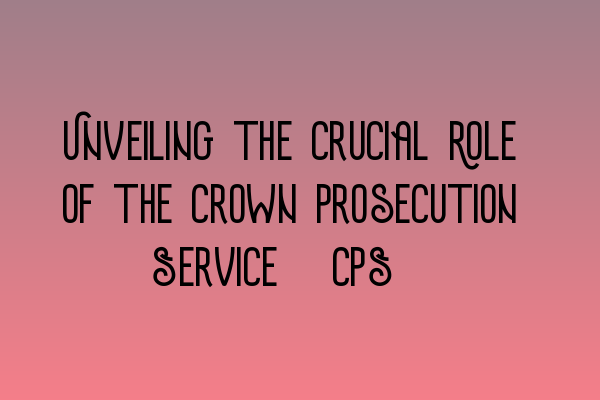Unveiling the Crucial Role of the Crown Prosecution Service (CPS)
Welcome to the SQE Criminal Law & Practice Law UK blog, where we provide you with valuable insights into
various aspects of the legal field. In this article, we will delve into the crucial role of the Crown Prosecution
Service (CPS) in the UK criminal justice system.
The Crown Prosecution Service: An Overview
The Crown Prosecution Service (CPS) plays a vital role in the criminal justice system of the United Kingdom. It
is responsible for prosecuting criminal cases that have been investigated by the police or other investigative
agencies. The CPS operates independently, making fair and impartial decisions based on the evidence presented to
them.
Having a good understanding of the CPS and its functions is essential for law students and aspiring solicitors who
are preparing for the SQE exams. If you’re looking for SQE 1 practice exam questions or SQE 1 practice mocks,
check out our SQE 1 Practice Exam Questions and SQE 1 Practice
Mocks FLK1 FLK2 articles. These resources will help you gauge your knowledge and enhance your exam
preparation.
The Role of the CPS in the Criminal Justice Process
Once the police have gathered evidence in a criminal case, they forward it to the CPS for review and potential
prosecution. The CPS carefully examines the evidence and determines whether it is in the public interest to
proceed with the case. They consider factors such as the strength of the evidence, the seriousness of the
offense, and the impact of prosecution on the victim and the community.
If you’re interested in learning more about the criminal justice process in the UK and the role of the CPS, our
SQE 2 Preparation Courses cover this topic in detail. Check out our SQE 2 Preparation Courses article
for more information.
The Responsibilities of the CPS
The CPS has several key responsibilities:
- Deciding whether to prosecute a case based on the evidence available.
- Preparing cases for court, including reviewing evidence and witness statements.
- Presenting the prosecutor’s case in court, cross-examining witnesses, and making legal arguments.
- Working closely with the police and other investigative agencies to gather additional evidence if
needed. - Advising the police during the investigation process to ensure that evidence is collected lawfully and in
line with the Human Rights Act.
If you want to stay updated on the latest SQE exam dates and other important information, take a look at our SRA SQE Exam Dates article.
Conclusion
The Crown Prosecution Service (CPS) plays a critical role in the UK criminal justice system. Understanding its
functions and responsibilities is essential for law students and aspiring solicitors. If you’re preparing for
the SQE exams, be sure to make use of our SQE 1 and SQE 2 preparation courses, as well as our practice exam
questions and mocks. These resources will help you develop a comprehensive understanding of the CPS and excel
in your exams.
Thank you for reading this article. If you have any further questions or need assistance, feel free to contact
us at SQE Criminal Law & Practice Law UK.
